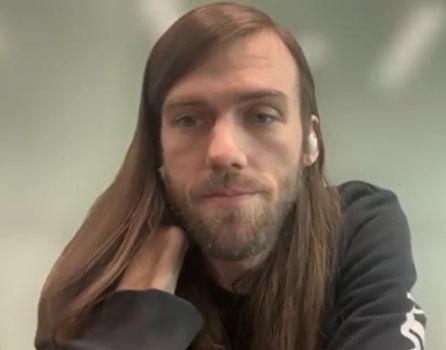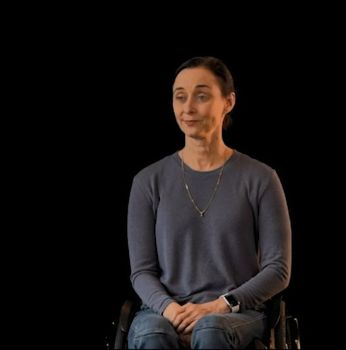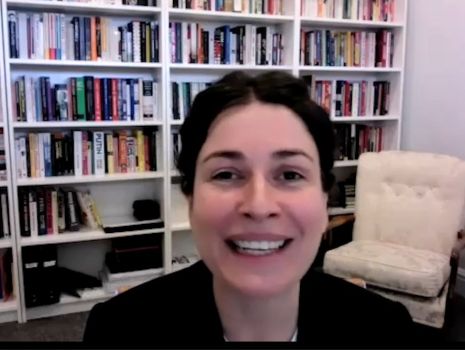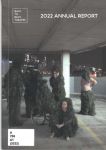Items
Search full-text
“Australia Council releases its first Disability Action Plan”
-
“The Asia-Pacific Wataboshi festival comes to Brisbane” Hosted by Arts Access Qld, in 2003, the Asia-Pacific Wataboshi festival was brought to Brisbane with the aim to raise the profile of disability arts. David Helfgott was the ambassador.
-
“80 wheelchair users and allies halt Melbourne trams, demanding better access to public transportation” In a 2000 demonstration organised by the Catch a Tram group, 80 wheelchair users and their allies halted city trams in Melbourne during lunch hours, demanding better access to public transportation.
-
“Writeability (VIC) is established in 2012” The Writeability program was established in 2012, beginning as a partnership between Writers Victoria and Arts Access Victoria. "Writeability program supports writers with disability wanting to develop their skills and writing careers." It aims to remove barriers and provide information, resources, and fellowships so disabled writers can “tell their own stories in their own way”.
-
”Racheal Missingham, Bree Hadley (2022) Oppression and allyship in Australia's Deaf Arts. Australasian Drama Studies, 80, pp. 304-332.” "In this article, we investigate the history of Deaf theatre in Australia, through the lens of oppression and allyship. Through a review of the to date limited academic, industry, and media literature, in conjunction with survey and interview research with Deaf theatre practitioners, this research sheds light on Deaf theatre makers’ perceptions of the ways in which ally support can operate to create both social benefits and barriers, and how this has impacted on the non-linear development and recent decline in Deaf theatre companies in Australia. It finds that, in developing a framework to scaffold stronger allyship relationships with d/Deaf and hard of hearing artists, it is critical to consider the accessibility and cultural requirements not just in relation to theatre methodologies, but in relation to arts management practices, which support continuing company production, too."
-
 "Interview with Daniel Savage" Daniel Savage is an artist and disability advocate working in mediums of photography, video and performance. Interview Summary: Daniel discussed his background as a disabled contemporary artist primarily focused on photography, with additional interests in video and performance. Daniel detailed the journey through his artistic career, highlighting significant experiences such as art school education, early influences, and the impact of acquiring a disability. He also explored the evolution of his style and interests, particularly his shift towards digital technology and his involvement in advocacy for accessibility in the arts. Daniel also shared his perspectives on the challenges and achievements within the disability arts scene in Australia, including public awareness and integration with contemporary art.
"Interview with Daniel Savage" Daniel Savage is an artist and disability advocate working in mediums of photography, video and performance. Interview Summary: Daniel discussed his background as a disabled contemporary artist primarily focused on photography, with additional interests in video and performance. Daniel detailed the journey through his artistic career, highlighting significant experiences such as art school education, early influences, and the impact of acquiring a disability. He also explored the evolution of his style and interests, particularly his shift towards digital technology and his involvement in advocacy for accessibility in the arts. Daniel also shared his perspectives on the challenges and achievements within the disability arts scene in Australia, including public awareness and integration with contemporary art. - Australian Film Commission (AFC)
-
 "Interview with Michelle Ryan" Michelle Ryan is the artistic director of Restless Dance Theatre and has extensive experience as a dancer and performer. Interview Summary Michelle Ryan, the artistic director of Restless Dance Theatre, shares her journey from being a successful dancer diagnosed with multiple sclerosis at 30 to becoming an advocate for artists with disabilities. Despite her initial hesitations to perform with her disability, a positive experience dancing with a European company reignited her passion and led her to Restless Dance Theatre, where she aims to change perceptions of who can create art. Michelle emphasizes the importance of providing professional opportunities and proper compensation for disabled artists, challenging the notion that disability work is charity or hobbyist. She advocates for representation that is genuine and not tokenistic, ensuring the inclusion of people with disabilities is meaningful and respectful.
"Interview with Michelle Ryan" Michelle Ryan is the artistic director of Restless Dance Theatre and has extensive experience as a dancer and performer. Interview Summary Michelle Ryan, the artistic director of Restless Dance Theatre, shares her journey from being a successful dancer diagnosed with multiple sclerosis at 30 to becoming an advocate for artists with disabilities. Despite her initial hesitations to perform with her disability, a positive experience dancing with a European company reignited her passion and led her to Restless Dance Theatre, where she aims to change perceptions of who can create art. Michelle emphasizes the importance of providing professional opportunities and proper compensation for disabled artists, challenging the notion that disability work is charity or hobbyist. She advocates for representation that is genuine and not tokenistic, ensuring the inclusion of people with disabilities is meaningful and respectful. - ACT DisAbility Arts Festival
-
 "Interview with Astrid Edwards" Astrid Edwards is a writer, publisher, lecturer, podcast host and disability advocate. Interview Summary Astrid Edwards, a former teacher and policy consultant, discusses in the interview how she pivoted her career towards writing and literature after being diagnosed with multiple sclerosis at 32, inspiring her to focus on work she loves. Astrid talks about writing at RMIT University, working with a diverse cohort of students, (many of whom have disabilities or are writing about trauma), which she finds rewarding. Though her work includes advocacy roles and a focus on disability, she does not wish to be defined solely by her illness, emphasizing the importance of allowing disabled individuals the freedom to explore and create beyond their disabilities. Currently, Astrid says she is a judge for the Stella Prize and discusses exploring a potential PhD about publishing and climate fiction, expressing a passion for addressing climate change within her work.
"Interview with Astrid Edwards" Astrid Edwards is a writer, publisher, lecturer, podcast host and disability advocate. Interview Summary Astrid Edwards, a former teacher and policy consultant, discusses in the interview how she pivoted her career towards writing and literature after being diagnosed with multiple sclerosis at 32, inspiring her to focus on work she loves. Astrid talks about writing at RMIT University, working with a diverse cohort of students, (many of whom have disabilities or are writing about trauma), which she finds rewarding. Though her work includes advocacy roles and a focus on disability, she does not wish to be defined solely by her illness, emphasizing the importance of allowing disabled individuals the freedom to explore and create beyond their disabilities. Currently, Astrid says she is a judge for the Stella Prize and discusses exploring a potential PhD about publishing and climate fiction, expressing a passion for addressing climate change within her work. -
 "Back to Back Theatre - Annual Report 2022" Back to Back Theatre Annual Report 2022 - Chair’s Report, international premiere of film SHADOW, continued international touring of original stage show THE SHADOW WHOSE PREY THE HUNTER BECOMES, continued touring GANESH VERSUS THE THIRD REICH and THE DEMOCRATIC SET, premieres of new screen works FIRST RESPONDERS (ABC) and WHATEVER SCARES YOU (SBS), immersive installation DREAMS FEEL REAL WHEN YOU'RE IN THEM from Theatre of Speed, CAMP training weekends, creative development of new Back to Back work MULTIPLE BAD THINGS, ensemble member development of their own works.
"Back to Back Theatre - Annual Report 2022" Back to Back Theatre Annual Report 2022 - Chair’s Report, international premiere of film SHADOW, continued international touring of original stage show THE SHADOW WHOSE PREY THE HUNTER BECOMES, continued touring GANESH VERSUS THE THIRD REICH and THE DEMOCRATIC SET, premieres of new screen works FIRST RESPONDERS (ABC) and WHATEVER SCARES YOU (SBS), immersive installation DREAMS FEEL REAL WHEN YOU'RE IN THEM from Theatre of Speed, CAMP training weekends, creative development of new Back to Back work MULTIPLE BAD THINGS, ensemble member development of their own works. - National Gallery of Victoria
- NGV
- National Gallery of Victoria VicHealth Access Gallery
- Kitty Ginter
- Council of Adult and Community Further Education
-
“Deaf activist and artist Asphyxia creates a music course and accessible music app for D/deaf people” Asphyxia, a profoundly Deaf Australian activist, artist, author and composer created a music course (2020) for people who are D/deaf and Hard of Hearing to write their own music. In 2023, Asphyxia also created an app called Amplio to make music more accessible to D/deaf people.
-
“WHO International Classification of Impairment, Disabilities and Handicaps (1976)” International classification of impairments, disabilities, and handicaps: a manual of classification relating to the consequences of disease, published in accordance with resolution WHA29.35 of the Twenty-ninth World Health Assembly, May 1976
-
“Les Murray's poetry is influenced by his autism” In 1974, Les Murray wrote a poem about autism, ‘Portrait of the Autist as a New World Driver’. Over the decades since, autism has continued to be a theme, as recognised by Amanda Tink.
-
"Weave Movement Theatre formed" Weave Movement Theatre was formed in 1997 following a series of workshops (organised by Arts Access) led by Adam Benjamin, director of CandoCo, a world-renowned inclusive dance company. Janice Florence was asked to facilitate classes prior to the workshops.
-
"Back to Back Theatre established" The theatre company Back to Back was established in 1987. They are a drama group comprising artists with intellectual disabilities who have since toured both nationally and internationally in mainstream Australian theatre.
-
“The Deaf Film Society creates the documentary ‘Our World’.” In 1970, the Deaf Film Society created a documentary called ‘Our World’ on the lived experience of people who were d/Deaf. The Adult Deaf Society assisted with the project.
-
“Disabled actors perform at Melbourne Concert Hall” In 1982, 50 “handicapped” actors (though none were named in the media) were involved in Access Arts’ ‘Theorem’ at the Melbourne Concert Hall, an example of inclusive arts practice. The performance received broad public attention.
-
“Access Arts commissions a multi-arts project, Peter Vance performs the song ‘Welcome to My Day’ at the 1999 Wataboshi Festival in Japan” Peter Vance was asked by Access Arts to team up with Ant McKenna to compose a song. He then performed ‘Welcome to My Day’ at the 5th Asia Pacific Wataboshi Music Festival in Japan in 1999. Access Arts sent disposable cameras out to members across Queensland; each story became a collage in the State Library foyer as a day-in-the-life of each artist.
-
“The paralympic arts festival, Invincible Summer, is held in conjunction with the 2000 Paralympic games” In 2000, Sydney held the Paralympic games. The paralympic arts festival, Invincible Summer, featured comedy, dance, film, art, music, theatre, and street performance, featuring collaborations between artists with and without disabilities.
-
“Bus Stop Films begins operation in 2009” Bus Stop Films began operations in 2009. In their own words, they “educate, create and advocate.” Their primary focus is teaching filmmaking to disabled adults, but they also offer workshops to others of marginalised identities. Bus Stop “makes films with, for and about people from diverse backgrounds and abilities.” Their website lists support workers in every Australian state and territory.
